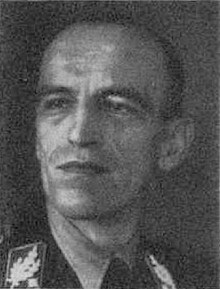Erwin Kraus
Erwin Kraus (born May 26, 1894 in Karlsruhe , † August 11, 1966 in Munich ) was a German politician ( NSDAP ) and corps leader of the NSKK .
Live and act
After attending the secondary school in Karlsruhe, Erwin Kraus studied mechanical engineering at the Technical University in Karlsruhe. From 1914 to 1918 he took part in the First World War with the Reserve Infantry Regiment 235 and with the Air Force . In the post-war period he belonged to the Berlin Freikorps , the Eastern Border Guard and an association in the Baltic States . In the 1920s, Kraus held leading positions in industry and transport, so from 1929 he was a freelance expert for motor vehicles and machines in Munich and Stuttgart .
Kraus became a member of the NSDAP for the first time in 1923 and rejoined the party after it was banned in 1930 ( membership number 247,608). He also became a member of the NSKK and acted as a technical advisor to the NSKK and Motor-SA. From 1930 to May 1933 Kraus was the leader of the Südwest group relay in Stuttgart. He was then from May 1933 to the summer of 1935 Head of Technology and Motor Vehicle Inspector South of the NSKK. From 1935 he was inspector for technical training and equipment at the NSKK and, due to his technical expertise, acted as Adolf Hühnlein’s right-hand man . At the NSKK he reached the rank of Obergruppenführer. From 1933 to 1942 he was also a member of the Supreme National Sports Authority for German motoring and was a delegate in international racing bodies. From March 1936 until the end of the Nazi regime in spring 1945, Kraus was a member of the National Socialist Reichstag for constituency 31 (Württemberg) .
After Hühnlein’s death, Kraus was appointed corps leader at the NSKK on June 21, 1942 and remained in this position until May 1945. In the final phase of World War II , he also took over the "technical advice in the Volkssturm and the compilation of special motorized units".
After the end of the war, Kraus was interned in Garmisch-Partenkirchen by the Allies . After a trial in Nuremberg , he was denazified as incriminated (Category II) in November . In addition to a three and a half year prison sentence, to which the internment detention was counted, a fine of 1,000 marks was imposed on him. He settled in Freiburg . In 1953 there were investigations against him and two other NSKK members into the murder of the NSKK member Lukat.
literature
- Joachim Lilla , Martin Döring, Andreas Schulz: extras in uniform: the members of the Reichstag 1933–1945. A biographical manual. Including the Volkish and National Socialist members of the Reichstag from May 1924 . Droste, Düsseldorf 2004, ISBN 3-7700-5254-4 .
- Dorothee Hochstetter: Motorization and “Volksgemeinschaft”. The National Socialist Motor Vehicle Corps (NSKK) 1931–1945 , Oldenbourg, Munich 2005, ISBN 3-486-57570-8 .
Web links
- Erwin Kraus in the database of members of the Reichstag
- Newspaper article about Erwin Kraus in the 20th century press kit of the ZBW - Leibniz Information Center for Economics .
Individual evidence
- ^ Dorothee Hochstetter: Motorization and "Volksgemeinschaft". The National Socialist Motor Corps (NSKK) 1931–1945 , Munich 2005, p. 131f.
- ^ A b Dorothee Hochstetter: Motorization and "Volksgemeinschaft". The National Socialist Motor Corps (NSKK) 1931–1945 , Munich 2005, p. 132
- ↑ cf. Hans-Joachim Weise: 70th anniversary of the liberation: “Volkssturm” - the last contingent of the Nazis ( memento of the original from June 3, 2016 in the Internet Archive ) Info: The archive link was inserted automatically and has not yet been checked. Please check the original and archive link according to the instructions and then remove this notice. . In: Our New Newspaper of April 21, 2015
| personal data | |
|---|---|
| SURNAME | Kraus, Erwin |
| BRIEF DESCRIPTION | German politician (NSDAP), MdR |
| DATE OF BIRTH | May 26, 1894 |
| PLACE OF BIRTH | Karlsruhe |
| DATE OF DEATH | August 11, 1966 |
| Place of death | Munich |
